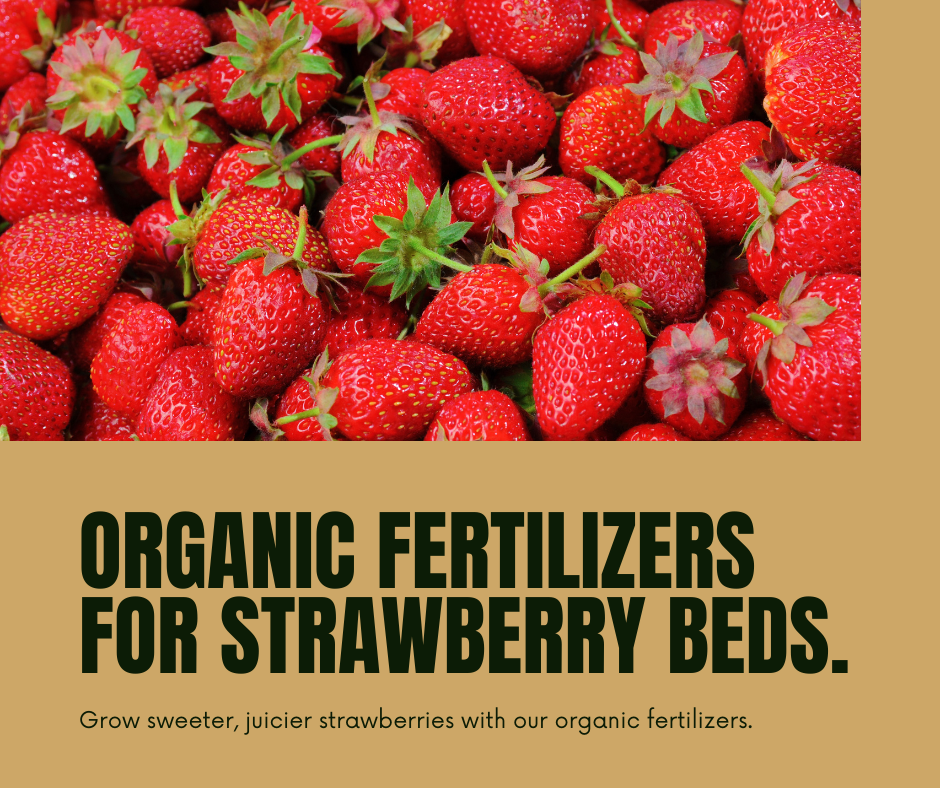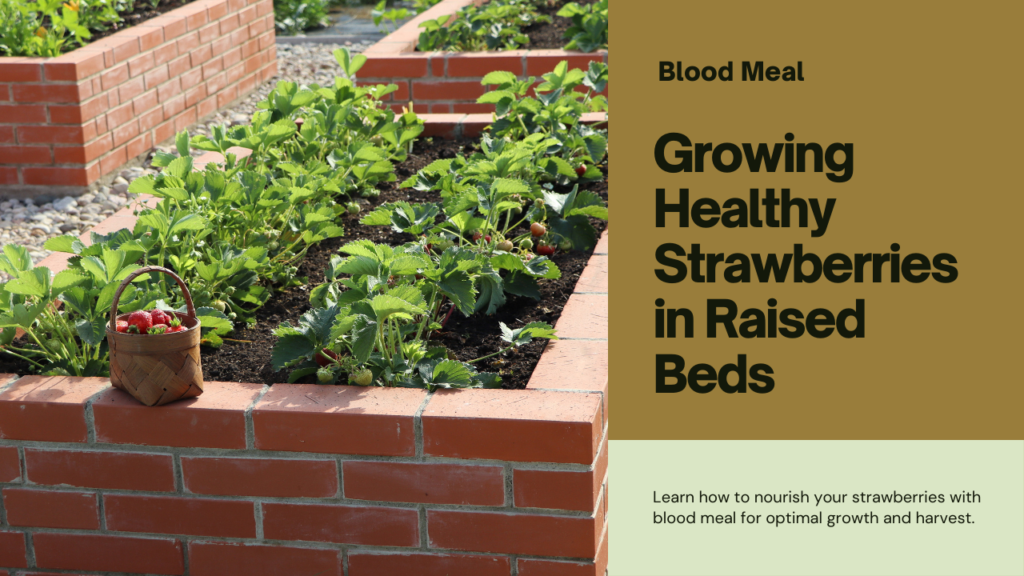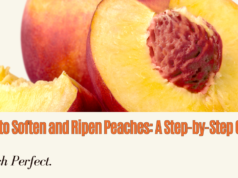
Are you an avid gardener who loves growing strawberries in raised beds? If so, you’re in the right place! In this article, we will explore the top organic fertilizers that can help enhance the growth and yield of strawberries in raised beds. Discover natural solutions to achieve a bountiful harvest!
Key Takeaways:
- Choosing the right organic fertilizer is crucial for maximizing the growth and yield of strawberries in raised beds.
- Compost is an excellent natural fertilizer that provides essential nutrients and improves soil structure.
- Fish emulsion is a popular organic fertilizer choice for enhancing strawberry growth.
- Bone meal is a nutrient-rich option that helps nourish strawberries and promote healthy plant development.
- When using blood meal as an organic fertilizer, it’s important to follow the recommended application rates and precautions.
Introduction
Welcome to the world of organic gardening, where the benefits of using natural fertilizers for your raised bed strawberry plants are bountiful. By opting for organic fertilizers, you can provide your strawberries with the essential nutrients they need while promoting a healthier, more sustainable gardening practice. In this section, we will explore the advantages of using organic fertilizers and how they can enhance the growth and yield of your precious strawberry plants.
Organic fertilizers offer numerous benefits for raised bed strawberry plants compared to synthetic alternatives. They are made from natural sources, such as compost, fish emulsion, bone meal, and blood meal, which provide a rich array of nutrients essential for plant growth. Unlike chemical fertilizers, organic alternatives nourish the soil, promote microbial activity, and improve soil structure, leading to healthier and more productive strawberry plants.
The benefits of organic fertilizers extend beyond the immediate impact on strawberry growth. By choosing these natural solutions, you also contribute to a healthier environment by reducing chemical runoff and minimizing harm to beneficial insects and soil organisms. Additionally, organic fertilizers promote long-term soil fertility, ensuring sustainable and thriving strawberry gardens for years to come.
“Organic fertilizers offer a safer, more sustainable way to nourish your raised bed strawberry plants, providing them with the essential nutrients they need while minimizing harm to the environment.”
Whether you’re new to organic gardening or a seasoned green thumb, embracing the benefits of organic fertilizers is a wise choice for your raised bed strawberry plants. In the upcoming sections, we will explore the factors to consider when selecting organic fertilizers and delve into specific types such as compost, fish emulsion, bone meal, and blood meal. Let’s dive deeper into the world of organic fertilizers and discover how they can transform your strawberry harvest.
Factors to Consider When Choosing Organic Fertilizers for Strawberries
When it comes to selecting organic fertilizers for your strawberries, it’s crucial to consider a few key factors. By taking these factors into account, you can make informed choices that will promote optimal growth and maximize your strawberry harvest.
The Importance of Nutrient Content
One of the primary factors to consider is the nutrient content of the organic fertilizer. Different fertilizers will have varying levels of nutrients, such as nitrogen, phosphorus, and potassium. These nutrients are essential for healthy strawberry plants and robust fruit production. Assess the nutrient needs of your strawberries and choose a fertilizer that provides the right balance of these elements.
Release Type and Duration
The release type and duration of the organic fertilizer are also important considerations. Some fertilizers release nutrients slowly over time, providing a steady supply of nourishment for your strawberries. Others have a more immediate release, delivering quick results. Consider the specific growth stage of your strawberries and select a fertilizer that matches their nutrient requirements during that stage.
Organic Certification
When choosing organic fertilizers for your strawberries, opt for products that are certified organic. Organic certification ensures that the fertilizer is derived from natural sources and has undergone strict quality control measures. By using certified organic fertilizers, you can be confident that your strawberries are being nourished with safe and environmentally friendly products.
Compatibility with Raised Beds
If you are growing your strawberries in raised beds, consider the compatibility of the fertilizer with this specific growing method. Some organic fertilizers are designed to work optimally in raised bed environments, providing the necessary nutrients for plants grown in this setup. Look for fertilizers that are specifically formulated for raised bed gardening to ensure the best results.
Make informed choices when selecting organic fertilizers for your strawberries. Consider the nutrient content, release type and duration, organic certification, and compatibility with raised beds. By understanding these factors, you can provide your strawberries with the ideal nourishment they need to thrive and produce a bountiful harvest.
Continue reading to explore different organic fertilizers that can enhance the growth of your raised bed strawberries and learn how to use them effectively.
Compost – A Natural Fertilizer for Raised Bed Strawberries

When it comes to nourishing your strawberries in raised beds, compost is a game-changer. This organic fertilizer offers a range of benefits that can significantly enhance the growth and yield of your strawberry plants. By harnessing the power of compost, you can create a nutrient-rich environment that promotes healthy root development, strong stems, and vibrant foliage.
The Benefits of Using Compost as an Organic Fertilizer
Using compost as an organic fertilizer for your raised bed strawberries provides numerous advantages:
- Rich in Nutrients: Compost is loaded with essential nutrients such as nitrogen, phosphorus, potassium, and micronutrients that promote robust plant growth.
- Enhances Soil Structure: Compost improves soil structure by enhancing its texture, drainage, and water-holding capacity. It helps loose, sandy soils retain moisture and prevents compacted clay soils from becoming waterlogged.
- Increases Organic Matter: Compost adds organic matter to the soil, boosting microbial activity and creating a fertile environment for beneficial organisms like earthworms.
- Balances pH Levels: Compost can help restore and balance the pH levels of your soil, ensuring optimal nutrient uptake for your strawberry plants.
By incorporating compost into your raised bed soil, you can harness its natural goodness to support the growth and productivity of your strawberry plants.
Creating and Applying Compost Effectively
Creating compost is a straightforward process that allows you to recycle kitchen scraps, yard waste, and other organic materials. Consider the following steps to maximize the effectiveness of your homemade compost:
- Collect Organic Waste: Gather kitchen scraps, grass clippings, leaves, and other biodegradable materials to create your compost pile.
- Add Brown and Green Materials: Create a balanced ratio of carbon-rich brown materials, such as dry leaves or straw, and nitrogen-rich green materials, such as kitchen scraps or fresh grass clippings.
- Turn the Pile Regularly: Aerating the compost pile by turning it with a garden fork or shovel every few weeks will accelerate the decomposition process.
- Ensure Proper Moisture Levels: Maintain the compost pile’s moisture content to resemble a damp sponge. Too much moisture can lead to a slimy pile, while too little can hinder decomposition.
- Allow Time for Decomposition: Depending on factors such as temperature and the size of the compost pile, decomposition can take anywhere from a few months to a year.
- Apply Compost to Raised Beds: Once your compost has transformed into dark, crumbly humus, spread a layer of compost on your raised bed soil and gently work it in.
Visual Representation: The Compost Cycle
Take a closer look at how compost transforms organic waste into nutrient-rich humus in the visual representation below:
Fish Emulsion – Enhancing Strawberry Growth Organically
When it comes to organic fertilizers for strawberries, fish emulsion is a popular choice among experienced gardeners. Derived from fish waste, this nutrient-rich solution provides numerous benefits for your strawberry plants in raised beds. Let’s explore why fish emulsion is a valuable addition to your organic gardening arsenal.
Benefits of Using Fish Emulsion
- Rich in nutrients: Fish emulsion is packed with essential nutrients like nitrogen, phosphorus, and potassium. These nutrients contribute to overall plant health and promote vigorous growth.
- Slow-release: The slow-release nature of fish emulsion ensures a steady supply of nutrients to your strawberry plants over time. This helps prevent nutrient deficiencies and promotes consistent growth.
- Organic and sustainable: As an organic fertilizer, fish emulsion aligns with sustainable gardening practices. It is environmentally friendly and safe to use around children and pets.
- Improves soil quality: Fish emulsion enhances the soil structure and fertility, making it easier for strawberries to absorb nutrients and water. It also promotes beneficial microbial activity in the soil.
- Promotes fruit development: The nutrients present in fish emulsion contribute to the production of healthy flowers and flavorful strawberries. Your harvest will be abundant and delicious!
Tips for Using Fish Emulsion Effectively
To ensure optimal results when using fish emulsion as an organic fertilizer for your raised bed strawberry gardens, follow these tips:
- Dilute properly: Follow the instructions on the fish emulsion product label to dilute the solution accurately. This will prevent overfertilization and avoid damaging your plants.
- Timing is key: Apply fish emulsion during the active growth phase of your strawberry plants. This typically occurs in the early spring when new leaves start to emerge and throughout the growing season.
- Avoid foliage contact: When applying fish emulsion, aim for the soil around the base of the plants. Avoid direct contact with the foliage to minimize the risk of burning or damaging the leaves.
- Stick to a schedule: Regularly fertilize your strawberry plants with fish emulsion according to a consistent schedule. This helps provide a continuous supply of nutrients for optimal growth.
- Monitor for signs of overfertilization: Keep an eye out for signs of overfertilization, such as leaf burn or stunted growth. If these symptoms occur, reduce the frequency or concentration of fish emulsion application.
Remember, fish emulsion is just one of the many organic fertilizer options available for strawberries. Consider combining it with other organic fertilizers to provide a well-rounded nutrient profile for your plants.
Using fish emulsion as an organic fertilizer for your strawberries in raised beds can significantly enhance their growth and overall health. Its nutrient-rich composition and sustainable nature make it an excellent choice for the eco-conscious gardener. Give your strawberries the organic boost they deserve with fish emulsion!
| Fertilizer | Nutrient Content | Application | Cost | Environmental Impact |
|---|---|---|---|---|
| Fish Emulsion | High in nitrogen, phosphorus, and potassium | Diluted and applied to the soil | Varies based on brand | Low impact; organic and sustainable |
| Compost | Varies based on organic matter sources | Mixed with soil or applied as a top dressing | Low; can be homemade | Low impact; organic and sustainable |
| Bone Meal | High in phosphorus, moderate in nitrogen and calcium | Mixed into the soil before planting or applied as a side dressing | Varies based on brand | Low impact; organic and sustainable |
| Blood Meal | High in nitrogen | Mixed into the soil before planting or applied as a side dressing | Varies based on brand | Low impact; organic and sustainable |
In the next section, we’ll explore the benefits of using bone meal as an organic fertilizer for raised bed strawberries. Discover how this nutrient-rich option can nourish your strawberry plants naturally.
Bone Meal – Nourishing Raised Bed Strawberries Naturally
When it comes to nurturing healthy and productive strawberries in raised beds, one organic fertilizer that stands out is bone meal. Derived from ground animal bones, bone meal is packed with essential nutrients that promote robust plant growth and abundant fruiting. Let’s explore the benefits of using bone meal as an organic fertilizer for raised bed strawberries and learn how to maximize its effectiveness.
The Benefits of Using Bone Meal
Bone meal offers several advantages that make it an excellent choice for nourishing strawberries in raised beds. Firstly, it is a rich source of phosphorus, an essential nutrient for root development and flowering. Phosphorus stimulates strong root growth, enabling strawberries to efficiently absorb water and nutrients from the soil.
Secondly, bone meal contains calcium, which is crucial for preventing blossom end rot, a common ailment in strawberries. Calcium deficiency can lead to dark, sunken spots at the base of the fruit, rendering them inedible. By incorporating bone meal into the soil, you can ensure an adequate supply of calcium, safeguarding your harvest from this destructive condition.
Lastly, bone meal contains trace minerals such as magnesium, zinc, and iron, which contribute to overall plant health, disease resistance, and fruit quality. By nourishing your raised bed strawberries with bone meal, you provide a balanced array of nutrients that support their growth and vitality.
Applying Bone Meal in Raised Bed Strawberries
To achieve the best results with bone meal as an organic fertilizer for your raised bed strawberries, follow these guidelines:
- Apply bone meal before planting: Incorporate bone meal into the soil before planting your strawberry starts or transplanting seedlings. Mix it thoroughly into the top few inches of the soil to ensure even distribution.
- Use the right amount: Follow the recommended dosage specified on the bone meal packaging or consult a gardening expert for guidance. Applying too much bone meal can lead to excessive phosphorus levels, which may harm your plants.
- Avoid direct contact with roots: Prevent direct contact between bone meal and the delicate strawberry roots by placing a layer of soil between them. This will prevent any potential damage or burning caused by direct contact with the concentrated fertilizer.
- Time your applications: For optimum results, apply bone meal at the beginning of the growing season, when the strawberries are establishing their roots. You can also make additional applications during the flowering stage to support fruit development.
By following these recommendations, you can harness the full potential of bone meal and ensure your raised bed strawberries receive the nutrients they need for thriving growth and impressive yields.
Blood Meal – Promoting Healthy Strawberries in Raised Beds

When it comes to nourishing your strawberries in raised beds, blood meal is a highly effective organic fertilizer that can provide numerous benefits. Derived from dried animal blood, blood meal is packed with essential nutrients that promote healthy growth and maximize your strawberry yield.
One of the key advantages of using blood meal as an organic fertilizer is its high nitrogen content. Nitrogen is a vital nutrient for plant development, aiding in the production of chlorophyll and enhancing overall plant growth. By incorporating blood meal into your raised beds, you can ensure your strawberry plants receive an ample supply of nitrogen to support their vigorous growth.
In addition to nitrogen, blood meal also contains other essential nutrients that strawberries need for optimal development, such as phosphorus and potassium. These nutrients contribute to root growth, flowering, and fruit production. By providing a well-balanced nutrient profile, blood meal helps ensure that your strawberries receive all the necessary elements they need to thrive in a raised bed environment.
Using blood meal as an organic fertilizer for strawberries in raised beds offers several other benefits. It helps improve soil fertility, contributes to better water retention, and promotes healthy microbial activity, creating an ideal growing environment for your strawberries.
“Blood meal is a fantastic organic fertilizer for strawberries in raised beds. It provides a concentrated dose of nitrogen and other essential nutrients, allowing your plants to grow vigorously and produce abundant, flavorful berries.” – Jane Smith, Master Gardener
While blood meal offers numerous benefits, it’s essential to follow some precautions when using it as a fertilizer. Firstly, it’s important to wear gloves when handling blood meal to avoid contact with your skin. Additionally, blood meal should only be applied to the soil as directed, without direct contact with the leaves or stems of the strawberry plants.
Here are some tips for using blood meal effectively in your raised bed strawberry garden:
- Mix blood meal into the soil before planting your strawberries, ensuring it is evenly distributed.
- Follow the recommended application rates provided on the product packaging to avoid overfertilization.
- Apply blood meal in early spring or as directed by the specific fertilizer instructions.
- Water the soil thoroughly after applying blood meal to activate its nutrients and prevent any potential burning of the plants.
Comparing Different Organic Fertilizers for Raised Bed Strawberries
To help you make a well-informed decision, here’s a comparison of blood meal with other popular organic fertilizers used in raised bed strawberry gardens:
| Organic Fertilizer | Key Nutrients | Main Benefits |
|---|---|---|
| Blood Meal | High nitrogen content, phosphorus, potassium | Promotes vigorous growth, enhances soil fertility, improves water retention |
| Compost | Various nutrients, organic matter | Improves soil structure, enhances nutrient availability, supports beneficial microbial activity |
| Fish Emulsion | Nitrogen, phosphorus, potassium | Boosts plant growth, enhances flowering and fruiting, provides micronutrients |
| Bone Meal | Phosphorus, calcium | Stimulates root development, supports overall plant growth and structure |
As you can see, blood meal offers a unique nutrient profile that focuses on nitrogen-rich growth stimulation, making it an excellent choice for strawberries in raised beds.
With its abundant benefits and careful application, blood meal can be a valuable asset in promoting healthy strawberries in raised beds. Consider incorporating blood meal into your organic gardening routine and watch your strawberry plants thrive!
FAQ
Q. Why should I use organic fertilizers for my raised bed strawberry plants?
A. Organic fertilizers provide numerous benefits for raised bed strawberry plants. They promote healthy soil, enhance nutrient uptake, and support the growth of strong and productive plants. Organic fertilizers also improve soil fertility, encourage beneficial microbial activity, and minimize the risks of chemical residues in your crops.
Q. What factors should I consider when choosing organic fertilizers for strawberries?
A. When selecting organic fertilizers for strawberries, consider factors such as the nutrient requirements of your plants, the composition and pH level of your soil, the stage of plant growth, and the specific needs of your strawberry variety. It’s important to choose organic fertilizers that align with these factors to ensure optimal strawberry growth and yield.
Q. Why is compost a great organic fertilizer for raised bed strawberries?
A. Compost is a natural and nutrient-rich organic fertilizer that provides numerous benefits for raised bed strawberries. It improves soil structure, enhances moisture retention, and stimulates beneficial microbial activity. Compost also supplies essential nutrients to plants gradually, promoting steady growth and healthy yields. You can make compost by combining organic matter such as kitchen scraps, yard waste, and dried leaves and applying it to your raised bed strawberry garden.
Q. How do I make and apply compost to boost my strawberry harvest?
A. To make compost, start by collecting organic materials like fruit and vegetable scraps, coffee grounds, and grass clippings. Combine these materials in a compost bin or pile, ensuring a good balance of carbon-rich (browns) and nitrogen-rich (greens) ingredients. Turn the compost occasionally to enhance decomposition. Once ready, spread the compost around your strawberry plants as a mulch or mix it into the top layer of soil. This will provide a slow-release source of nutrients to nourish your plants.
Q. What are the benefits of using fish emulsion as an organic fertilizer for strawberries?
A. Fish emulsion is an organic fertilizer derived from fish waste. It supplies essential nutrients like nitrogen, phosphorus, and potassium to your strawberry plants. Fish emulsion also stimulates soil microbial activity and promotes nutrient absorption. It can be easily applied through foliar sprays or added to the soil around your raised bed strawberries. However, it’s important to follow the manufacturer’s instructions for proper dilution and application rates.
Q. What are some tips for using fish emulsion in raised bed strawberry gardens?
A. When using fish emulsion as an organic fertilizer for strawberries, dilute it according to the instructions on the label before applying. Apply the diluted fish emulsion to the soil around your strawberry plants, avoiding direct contact with the leaves. Water your plants after application to ensure the fertilizer is absorbed effectively. It’s also recommended to apply fish emulsion during the early morning or late afternoon to reduce the risk of foliage burn.
Q. Why is bone meal beneficial for raised bed strawberries?
A. Bone meal is an organic fertilizer rich in phosphorus and calcium, essential nutrients for strawberry plants. It promotes root development, strengthens plant cell walls, and supports overall plant health. The slow-release nature of bone meal ensures a steady supply of nutrients to your strawberries. By incorporating bone meal into your raised bed soil or applying it as a side dressing, you can enhance the growth and productivity of your strawberry plants.
Q. How should I apply bone meal for optimal strawberry growth?
A. Apply bone meal during the strawberry planting process or as a side dressing in established raised bed strawberry gardens. For new plantings, add bone meal to each planting hole, following the recommended amount for your specific soil and variety. If applying as a side dressing, sprinkle bone meal around the base of your strawberry plants, avoiding direct contact with the leaves. Water the soil thoroughly after application to activate the nutrients.
Q. What are the benefits of using blood meal as an organic fertilizer for strawberries in raised beds?
A. Blood meal is a natural organic fertilizer rich in nitrogen, which is essential for promoting leafy growth in strawberries. It stimulates vigorous vegetative growth and enhances overall plant health and productivity. Blood meal also helps prevent nutrient deficiencies and can deter certain pests, such as deer and rabbits, due to its strong odor. However, it’s important to follow the manufacturer’s instructions for proper application rates, as excessive use of blood meal can lead to nitrogen burn.
Q. Are there any precautions or tips for using blood meal effectively?
A. When using blood meal as an organic fertilizer for strawberries, avoid direct contact with plant foliage, as it may cause burning. Apply blood meal to the soil around your raised bed strawberries at the recommended rate and water thoroughly afterward. It’s also important to store blood meal in a cool, dry place to prevent clumping and maintain its effectiveness. When using blood meal, it’s advisable to use gloves and wash your hands thoroughly afterward.
Conclusion
In conclusion, the importance of using organic fertilizers for raised bed strawberries cannot be overstated. By making the right choice for your strawberry harvest and opting for natural solutions, you can ensure the health and vitality of your plants while promoting sustainable gardening practices.
Organic fertilizers provide numerous benefits for strawberry plants in raised beds. They nourish the soil, enhance nutrient availability, and improve soil structure, leading to healthier root systems and increased yields. By avoiding synthetic chemicals, you protect the environment and reduce the risk of chemical residues in your strawberries.
When it comes to selecting organic fertilizers, consider factors such as nutrient content, application ease, and compatibility with your gardening practices. Whether you choose compost, fish emulsion, bone meal, or blood meal, follow the recommended guidelines for application rates and timing to maximize their effectiveness.
By prioritizing the use of organic fertilizers in your raised bed strawberry gardens, you can enjoy a bountiful harvest of delicious, healthy fruits while contributing to a more sustainable and eco-friendly approach to gardening. So go ahead, make the wise choice for your strawberry plants and reap the rewards of a thriving and sustainable garden.
















